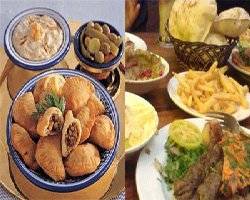Ramadan is the time when families and friends get together to break the fast; it is a time for traditional cuisine, invitations to banquets and Iftaar parties laden with sumptuous food and desserts. Most of us know that these foods, when eaten in excess, cause unwanted weight gain and may exacerbate health conditions like diabetes, high blood pressure and obesity. Fried and calorie-rich foods remain undigested because fat is the last nutrient to be digested and cause a number of digestive problems including heartburn and stomach upsets. This does not mean that one should avoid these foods at all costs. Instead, one should opt to eat dates and drink plenty of water, milk and fresh fruit juice and salads, consider fried foods and rich sweets as occasional indulgences.
Dr. Peter Toth, Fellow of the American College of Cardiology, in his book Lipidology, has demonstrated that during Ramadan, the 'bad' blood cholesterol level in fasting Muslims lowers automatically. The normal recommended guideline for fat intake is 30 percent or less of the total energy intake.
During Ramadan increased gastric acidity is often noticed, with symptoms such as a burning feeling in the stomach, heaviness in the stomach and a sour taste in the mouth. Whole wheat bread, vegetables, hummus, beans, and fruits are all excellent sources of dietary fiber and trigger muscular action in the digestive system, churning and mixing food, breaking food into small particles, binding bile acids, opening the area between the stomach and the duodenum-jejunum and moving the digested material in the small intestine. Thus, dietary fiber helps reduce gastric acidity and excess bile acids and prevents constipation.
Patients suffering from peptic ulcers are strongly advised to avoid spicy foods and consult a doctor for appropriate medicine and diet. Patients suffering from diabetes, particularly severe type I (insulin dependent) or Type II (non-insulin dependent), must consult their doctor for the type and dosage of medicine, and diet and precautions to be taken during the month. Generally, diabetes mellitus, Type II, is manageable through proper diet during Ramadan.
Incredibly, many people report a weight gain during Ramadan, in spite of fasting throughout the month. This can only be attributed to over-indulgence calorie-rich food and lack of physical activity during the month. Allah The Almighty Says (what means): {“O you who have believed, decreed upon you is fasting as it was decreed upon those before you that you may become righteous.”}[Quran 2: 183]
Eat in moderation to avoid gaining weight, as the Messenger of Allah,  , said: “No human ever filled a vessel worse than the stomach. Sufficient for any son of Aadam are some morsels to keep his back straight. But if it must be, then one third for his food, one third for his drink and one third for his breath.” [Ahmad and At-Tirmithi]
, said: “No human ever filled a vessel worse than the stomach. Sufficient for any son of Aadam are some morsels to keep his back straight. But if it must be, then one third for his food, one third for his drink and one third for his breath.” [Ahmad and At-Tirmithi]
For the observant Muslim, Ramadan is a time for spirituality and not culinary excess. Unfortunately, today a great deal of the focus is on food, at home while entertaining friends and family as well as in community functions. It is easy, when hungry and in company, to overeat and to end up gaining weight by the end of Ramadan. To prevent weight gain, take the focus away from different varieties of food during Ramadan towards acts of worship and obedience to Allah The Almighty. It is impossible for a believer who has indulged in overeating and is afflicted by lethargy to pray with humility and presence of mind. It is recommended that we emulate the practice of Prophet Muhammad,  , and break the fast with dates and then perform prayer. By the time the prayer is over, the blood sugar will be balanced and there will be less of a desire to overeat. This is time that the evening meal should be taken, which should be light and easy to digest.
, and break the fast with dates and then perform prayer. By the time the prayer is over, the blood sugar will be balanced and there will be less of a desire to overeat. This is time that the evening meal should be taken, which should be light and easy to digest.
Doctors advise people looking to avoid gaining weight to avoid eating too many carbohydrates such as pasta, rice, bread, sweets and sugars, which are the most common culprits in weight gain. Instead, eat lots of protein because by doing so you will stop feeling hungry and end up eating less.


 Home
Home Discover Islam
Discover Islam Quran Recitations
Quran Recitations Lectures
Lectures
 Fatwa
Fatwa Articles
Articles Fiqh
Fiqh E-Books
E-Books Boys & Girls
Boys & Girls  Ramadan
Ramadan Fatwa Audios
Fatwa Audios Month of Mercy
Month of Mercy Women
Women Eed Al- Fitr
Eed Al- Fitr Food Recipes
Food Recipes Videos
Videos

 Prayer Times
Prayer Times












